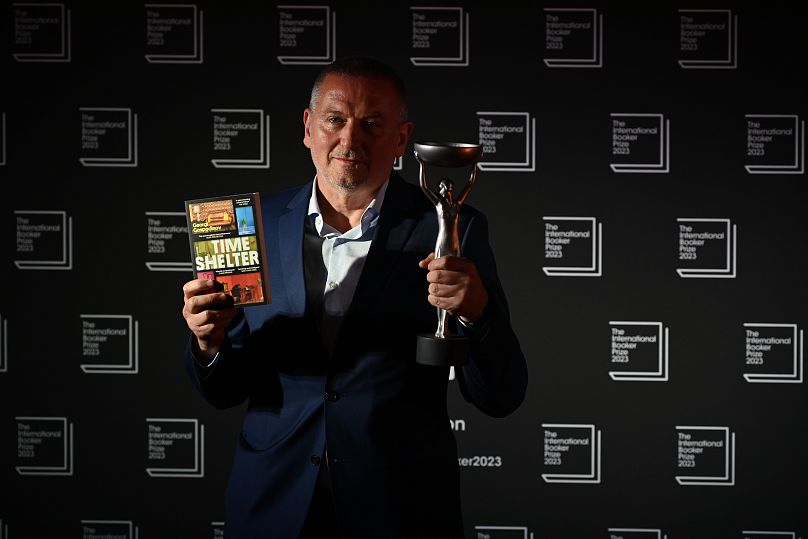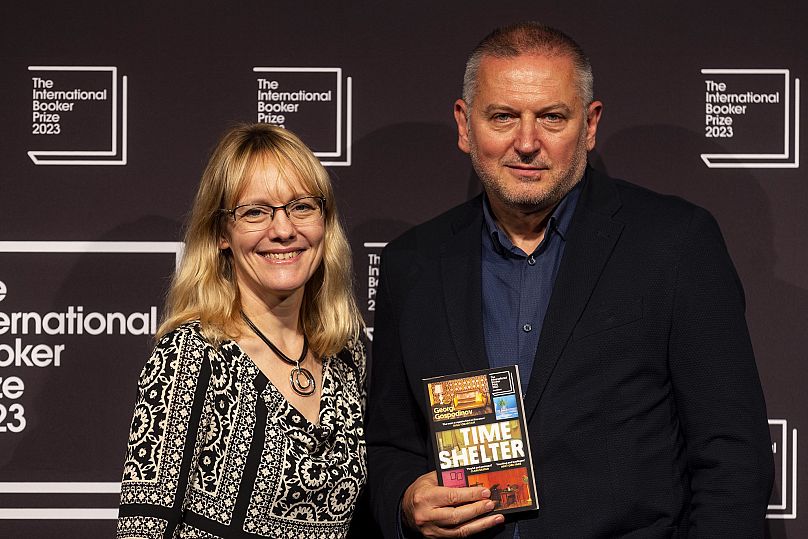Georgi Gospondinov says more stories from the Balkans and Eastern Europe are now being heard because of the tragedy unfolding in Ukraine.
Author Georgi Gospodinov made history this week as his novel ‘Time Shelter’ became the first ever Bulgarian book to win the International Booker Prize.
Translated with help from Angela Rodel, the novel beat 5 other works at a glitzy ceremony at London’s Sky Garden.
The work, which is Gospodinov’s fourth to be put into English, focuses on an Alzheimer’s treatment centre which creates an environment inspired by times gone by and eventually comes to serve as a refuge for healthy people tired of modern life.
‘Time Shelter’ was initially published in Bulgaria in 2020, where it topped the book charts and won the Strega European prize.
Thrills and spills
Euronews Culture had the pleasure of speaking to Gospodinov and Rodel after their win and they say they’re “thrilled” with the triumph, despite admitting they had had very little sleep since the award.
That’s not surprising given that they had to sit at the awards ceremony “in agony for several hours” before the book was announced as the winner. There were the pre-award nerves too - with Rodel explaining that she couldn’t decide whether or not they would snag the prize, explaining: “I would go back and forth: ‘we have a chance. We have no chance. We have a chance.’ It was like a rollercoaster ride.”
Both author and translator are especially pleased as the win has extra significance for Bulgaria as a nation, coming on the eve of the Bulgarian national holiday, which Gospodinov explains, is “dedicated to the Cyrillic alphabet”.
He hopes that the prize will help Bulgarian literature be more widely acknowledged across the globe, saying he thinks the win will “open the door to Bulgarian literature and also to literature in the [Balkan] region”, emphasising that work written in ‘small’ languages can often convey the most powerful messages.
Gospodinov also speaks with fondness about the support he got from the moment ‘Time Shelter’ was long-listed, saying, “I received many messages from many writers in the region, from Greece, Serbia, Macedonia - all across the Balkans. People were really glad. Only one book from the region was nominated - we all love this award”.
Commenting on the Ukraine conflict, he says that the region’s stories are being listened to more than ever because of the tragedy in Eastern Europe.
‘Time Shelter’ at its core is an exploration of the necessity not to dwell on the past too much. Gospodinov says that is exactly what Vladimir Putin has been doing since he invaded neighbouring Ukraine last year.
“I think Putin’s war is a war for the past,” he explains, adding: “Putin is obsessed with the past. Ukraine was ‘his’ territory in the 1940s and 1950s, but the problem is that you cannot live in the past and he’s trying to drag everyone back to the past with him. It’s really dangerous. Dangerous on the European scale and on the world scale”.
Gospodinov has always used his work to challenge a politically unstable world and ‘Time Shelter’ - and its message of not focusing on nostalgia to the detriment of present issues - is a perfect example of that.
Written after 2016, which saw the Brexit vote and Trump come to power, he explains that he wanted to write a book which accurately described the crises facing the world. “I grew up in Bulgaria, which was a communist country until 1989,” he says, “I remember how they promised us a bright future and I didn't want someone to sell the story of a ‘bright past’ to my daughter - I don’t believe in that empty statement.”
The author is concerned about the rise of populism and nationalism in Europe which was at its peak in 2016, especially, he says, in Bulgaria. The answer? “I wanted to write a dystopian novel, a novel that shows what could happen in the near future.”
Celebrating European values
That attitude applies to the advice Gospodinov has for aspiring writers hoping to emulate his success. He suggests reading literary greats like Kafka and Kundera and getting inspired by the values of European literature which will help up-and-coming writers - and readers too - to “develop empathy and stay on the losing side, the side of the victims”.
He says good literature is the antidote to propaganda peddled by governments and that it’s crucial to “fight propaganda using literature - that’s what so many good European writers have done”.
When asked about the increasing role of Artificial Intelligence in creative fields, Gospodinov says that he believes the technology will never be able to write a successful work of fiction, as a human touch is crucial in its creation. “Nobody knows the secrets of a good novel,” he says. “There’s no simple formula; it’s not something that you can calculate but the basis of any good novel is human emotions. I hope they’ll stay with human beings only.”
Pressed on what does make a successful novel - as, clearly, he knows - Gospodinov chuckles, saying: “To paraphrase: ‘What doesn't kill me makes me a writer’. It’s living life in a way that is not always positive. Experience. That’s what can make you a great writer.”
Following his win, it’s likely that Gospodinov’s success will escalate. He reveals that he has several works in the pipeline, including a top secret one - and he hopes to work with Angela Rodel on the translations once again.
And after that? He says he will continue to cross boundaries of literature with his novels that he calls “strange” and “not typical”. It’s likely his success will give Bulgaria and the wider Baltics a boost in terms of literature and that's something Gospodinov is very happy about. He hopes the award will spur more interest in writing from the region, explaining that it’s set for a place on the world stage: “We have many good storytellers. I hope that the interest will grow.”













